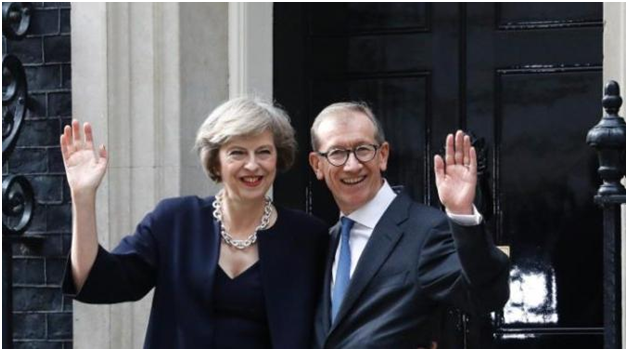UK PM May And Benazir Bhutto: Times of Wine From a Teapot, Sports Car Rides,Discos and Dates

LONDON: British Prime Minister Theresa May is among a gaggle of young Conservatives who surrounded the late Benazir Bhutto at Oxford. They paid court to her and enjoyed her legendary hospitality, including accepting rides in her yellow MG sports car.
For them and many others it was impossible not to be charmed and attracted by Benazir’s good looks, sparkling personality and the hint of power and influence she exuded as the daughter of a serving Prime Minister, Zulfikar Ali Bhutto, who was eventually overthrown in a military coup in 1977.
Like Benazir, May and the others made no secret of their political ambitions. When they met at Benazir’s legendary parties, or fraternised at the Oxford Union debating society, they talked of little else. Benazir’s favourite tipple on such occasions was chilled white wine, preferably served from a tea pot, and she had white wine in hand when she introduced May to her future husband Philip at a disco for young Conservatives.
Now May has become Prime Minister of her country – just like Benazir – but others from that group, such as Alan Duncan and Damian Green, also served as ministers in Conservative governments. The alliances from those years were cemented by stories of Benazir’s fabulous generosity. Many of her British friends were invited for holidays to the Bhutto family’s ancestral home in Larkana where they were entertained in feudal style, taken out on shooting parties, served hand, foot and finger by legions of servants.
One story brought back from Larkana, that was furtively told and re-told in the safety of Oxford student digs, was about how Benazir during her temper tantrums, the spoilt daughter of the Prime Minister, was liable to throw ash trays like flying saucers at servants who annoyed her.
There was method behind Benazir’s madness in cultivating these wannabe politicians. In the first place she wanted their backing to obtain a prestigious honorary degree for her beloved father who had also been at Oxford between 1950 and 1953. Influential academics who supported her in this campaign included the late Hugh Trevor Roper, then the Regius Professor of Modern History, but the student body was divided.
Many of the students, including Indian students, recalled Bhutto’s endorsement of the Pakistani army’s crackdown on the nationalists of East Pakistan, including the late Sheikh Mujibur Rahman, and the atrocities that followed. So the move to get Bhutto his honorary degree eventually just fizzled out. Benazir was much more successful in winning the support of her student friends in getting elected President of the prestigious Oxford Union in 1976, one year before her father was overthrown back home in Pakistan
So Benazir’s ghost will inevitably linger over May’s perspective on South Asia. True, some of that influence will be balanced by the equally strong personality of the new British Foreign Secretary, Boris Johnson, who is married to the daughter of a Sikh Mother and English father. He is the leader of the Brexiters who voted for Britain to leave the EU and could not be excluded from the new cabinet.
But May would be the first to admit she has better first hand knowledge of Pakistan which she has visited three times, including one occasion when she had a lengthy one-to-one session with Benazir’s husband, Asif Ali Zardari. Her only trip to India was in November 2012 when she visited the National Police Academy in Hyderabad.



